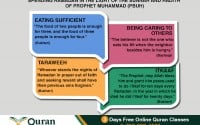Virtues Of The Month of Muharram
Islam has its own religious calendar that starts from the day Prophet Muhammad (PBUH) migrated to Madina and because of this reference the day is known as the Hijri calendar. The calendar comprises of twelve months that are based on the lunar sighting. The calendar begins with the month of Muharram.

There are numerous months in the Islamic calendar that are popular among Muslims because of the distinctive mentions of the months either in Quran or by Prophet Muhammad (PBUH). There is the month of Ramadan known for the fasting that takes place throughout the month. Then there is the month of Shawal known for the celebrations of Eid-ul-Fitr that takes place in this month and the month of Dhul-Hijjah in which Hajj and Eid-ul-Adha take place. The month of Muharram is also one of the reverened months about which the majority of Muslim population is not familiar. The lines below discuss the sanctity of the month of Muharram in addition to the virtues that this Holy month brings.
In Quran, Allah Almighty says:
“The number of months in the sight of Allah is twelve (in a year) – so ordained by Him the day He created the heavens and the earth; of them four are sacred; that is the straight usage. So wrong not yourselves therein and fight the pagans all together as they fight you all together. But know that Allah is with those who restrain themselves.” (9:36)
From the ayah it is clear that in the Islamic calendar there are four months that are most sacred and the best and in these months a Muslim should refrain from wronging themselves. It means that it is the month in which a Muslim must refrain from all sorts of evil doing to make sure that the month is put to best use in the form of committing good deeds and earning greater reward from them. The fact that Muharram is one of these sacred months can be affirmed from the following hadith of Prophet Muhammad (PBUH) in which He said:
“The year is twelve months of which four are sacred, the three consecutive months of Dhul-Qadah, Dhul-Hijjah and Muharram, and Raja Mudar which comes between Jumadah and Sha’ban.” (Bukhari)
Thus, from the hadith it is clear that Muharram is one of the sacred months that are mentioned in Quran and a Muslim is refrain from any kind of wrongdoings and it should be spent in doing deeds that bring reward so that because of the sanctity of the religion the reward could be increased and attained with multiple effect.
Pertaining to the virtues of the month of Muharram, the best of the virtues that the month brings is the reward against the fasting that a Muslim undertakes during the month of Muharram. Prophet Muhammad (PBUH) said in one of His hadiths:
“The best of fasts besides the month of Ramadan is the fasting of Allah’s month of Muharram.” (Muslim)
Two things become clear from this hadith, the first one is that Muharram is the month of Allah. Thus, any month that holds the status of being the month of Allah is surely to be special and bring special reward as well. The second thing that becomes clear from this hadith is the fact that after the obligatory fasting of the month of Ramadan the second best fasts are the ones that are kept in the month of Muharram. Therefore, if a Muslim is thinking of keeping voluntary fasts for the sake of reward, then he or she must consider keeping the fasts in the month of Muharram for greater benefits.
This increase in the reward for voluntary fast is further emphasized upon by Prophet Muhammad (PBUH) in the following hadith:
“The one that keeps a fast in the month of Muharram will receive the reward of thirty fasts for each fast (in this sacred month).” (Tabrani)
From the hadith it is clear that one fast kept in the month of Muharram equals thirty fasts kept in other months other than Ramadan. Moreover, the other thing to notice in this hadith is that this reward is not concerned with whether a person keeps fast for the whole month of Muharram and then each fast will get the reward equivalent to thirty fasts, rather if a person keeps only a single fast in this month it will bring the reward of thirty fasts independently.
The second important and renowned virtue of the month of Muharram is the day of Ashora and the recommended fasting on this day. The fasting on the day of Ashora has the history that starts from the day Prophet Muhammad (PBUH) migrated to Madina. When He migrated there, He saw the Jews fasting on the tenth day of Muharram and when they were inquired about their fasting, they replied that they fast as a gesture of greatfulness because it is the day when Prophet Moses liberated the Children of Israel from the clutches of Pharaoh and he was killed while crossing the red sea. Upon hearing this from the Jews, Prophet Muhammad (PBUH) replied:
“We are more closely related to Musa than you.” So Prophet (PBUH) fasted Himself and also directed Muslims to fast on the day of Ashora as well. (Abu Dawood)
From this hadith it is clear that Prophet Muhammad (PBUH) encouraged the fasting on the day of Ashora and undertook it as a celebration on association with Prophet Moses (AS). Hazrat Aisha (RA) also reported regarding the fast of Ashora in Bukhari Sharif saying that Prophet Muhammad (PBUH) ordered the observance of fast of Ashora until the fasts of Ramadan did not become compulsory and after that whoever willed kept the fast and those who did not they were not held accountable. Thus, the fast of Ashura predates the fasts of Ramadan and a Muslim should keep it whenever the chance becomes available.
In addition to fasting, there is another act that Prophet Muhammad (PBUH) recommended for the day of Ashora. In His hadith, He said:
“One who generously spends on his family on the day of Aashora, Allah will increase (his provision) for the whole year.” (Baihaqi)
Therefore, if one wishes to earn greatest reward possible for Ashora day or if one wishes to increase the provision, then he or she must opt for keeping the fast on the day of Ashora.
Conclusion:
In a nutshell, the sacredness of the month of Muharram is imperative and a Muslim must make sure that when he or she intends to keep voluntary fast, it should be done in the month of Muharram, especially on the day of Ashora for greater reward and religious benefit.
.









